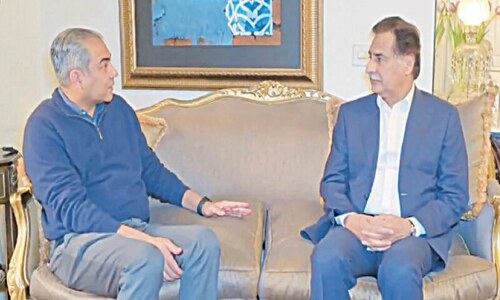Dr Zubair Khalid, 40, was always inquisitive, even when growing up in a village near Sargodha in the heartland of Pakistan’s Punjab. He was only a child when
his parents made the move to the provincial capital, Lahore, so their four sons could have access to better educational opportunities.
The move paid dividends, as his three brothers are now successfully running software houses in Lahore. Meanwhile, Dr Khalid charted out his path in academia and research, with unparalleled success.
In November this year, Dr Khalid was part of an international multidisciplinary, multi-institutional team that was awarded the prestigious Gordon Bell Prize in Climate Modelling by the Association for Computing Machinery (ACM). The 12-member team that worked at Saudi Arabia’s King Abdullah University of Science and Technology (KAUST) won the award for their project “Boosting Earth System Model Outputs and Saving PetaBytes in Their Storage Using Exascale Climate Emulators.”
Dr Zubair Khalid’s work on the Exascale Climate Emulator helped his team win the prestigious Gordon Bell Prize, making him the first Pakistani to receive the honour. It also has the potential to overhaul the way we prepare for extreme climate events…
This annual prize focuses on climate modelling and was introduced in 2023 to recognise the use of high-performance computing in climate modelling applications. Dr Khalid is the first Pakistani recipient of the Gordon Bell Prize.
A TRACK RECORD OF ACADEMIC EXCELLENCE
Dr Khalid was always an exceptional student. “From an early age, I was captivated by the power of problem-solving, often drawn to the elegance of mathematics and the possibilities of engineering,” he tells Eos.
He finished his undergraduate in electrical engineering from the University of Engineering and Technology in Lahore in 2008, topping the results and winning five gold medals. This would also mark the start of his journey as a researcher.
He then enrolled in a PhD programme at the Australian National University (ANU), with a merit-based scholarship funded by the Australian government under their Endeavour Awards. Later, he worked as a research fellow at ANU from 2013 to 2015. He moved back to Pakistan after that and joined the Lahore University of Management Sciences (LUMS), where he is currently working as an associate professor of electrical engineering.
It was around the same time that Pakistan was experiencing the unprecedented impact of climate change, particularly on urban systems and marginalised communities. Dr Khalid started his research in this field along with his colleagues at LUMS in 2020. His background in algorithmic innovations, engineering and artificial intelligence (AI) meant he was equipped to contribute meaningfully to the field.
“I am a mathematically inspired, engineering-trained and computationally motivated researcher, with expertise in artificial intelligence, machine learning, systems engineering, technology policy, computer vision, signal processing and optimisation,” he explains to Eos.
“I wanted to help create systems that not only improve the accuracy of predictions, but also empower communities to prepare better, mitigate damage, and adapt to a changing climate,” he continues.
Unbeknownst to him, his work would tie up with the development of the prize-winning Exascale Climate Emulator.
SAUDI INTERLUDE
It began in the summer of 2022, says Dr Khalid, when work started on a climate emulator project by Professor Marc Genton at KAUST and his postdoctoral researcher Dr Yan Song. Over the course of a year, they developed the core algorithms and scientific components of the project.
In 2023, when Dr Khalid’s sabbatical was due, he had several options to consider: to go to KAUST or explore options in the US, Australia or the UK. “Choosing KAUST turned out to be the right decision, as it allowed me to scale up the project and contribute to the development of the emulator,” continues Dr Khalid.
“The project was truly multidisciplinary in nature, as we had people from the industry, academia and national centres, with expertise in climate science, statistics, AI and high-performance computing,” he explains.
The team also included Sameh Abdulah, Marc G Genton, David E Keyes, Hatem Ltaief, Yan Song, Georgiy L Stenchikov and Ying Sun from KAUST; Allison H Baker from the NSF National Centre for Atmospheric Research, USA; George Bosilca from NVIDIA, the world leader in artificial intelligence computing; Qinglei Cao from St Louis University, USA; and Stefano Castruccio from the University of Notre Dame, USA.
THE EXASCALE CLIMATE EMULATOR
Think of the Exascale Climate Emulator as a “smart climate model”, explains Dr Khalid. Traditional climate models take a long time to run and produce enormous amounts of data that are difficult to store and analyse.
On the other hand, this “smart climate model” acts like a highly intelligent, compact version. Instead of running full simulations, it can predict climate patterns accurately and quickly by using smaller data inputs and advanced algorithms, he continues. “It is like having a highly detailed weather forecast system that can also predict long-term climate trends, without needing massive supercomputers every time,” says Dr Khalid.
Additionally, the emulator also leverages sophisticated algorithms and statistical techniques and, thus, uses fewer computational resources and data inputs. By bridging the gap between computational intensity and practical usability, the Exascale Climate Emulator enables faster, scalable and more actionable climate insights.
Locally and globally, the Exascale Climate Emulator is a transformative tool in addressing some of the most pressing challenges in climate science and policy-making. “Its capabilities enable significant advancements in how we understand, predict and respond to climate-related phenomena, both at the local and global scale,” says Dr Khalid.
RELEVANCE FOR PAKISTAN
On the global front, as in Pakistan, extreme weather events — such as floods, hurricanes, heatwaves and droughts — are becoming more frequent and severe due to climate change. Traditional climate models often struggle to provide precise, localised predictions because of computational limitations.
The Exascale Climate Emulator improves accuracy and speed in forecasting these events and, therefore, enables timely and accurate predictions. But one of its most groundbreaking features is its ability to provide climate data at an exceptionally fine scale (kilometre scale in space and hourly in time).
“This granularity enables localised disaster preparedness in small towns and communities that are often overlooked by broader models,” adds Dr Khalid. Another very relevant application of the emulator is to empower farmers to optimise planting schedules and irrigation strategies, based on highly localised weather and climate forecasts.
In Pakistan, the emulator can make a tangible difference, as it brings climate science closer to real-life solutions that protect lives and livelihoods. For example, by predicting events like the 2022 floods in Sindh, in the future, authorities can evacuate people earlier and reduce damage to homes and crops.
Heatwave preparedness is another aspect. During heatwaves such as the ones in 2024, knowing when and where temperatures will spike can help cities plan preventive measures and medical responses.
The ability to make better farming decisions is yet another example where Pakistani farmers can use the emulator’s predictions to decide the best times to plant or harvest crops, improving yields and reducing losses. Alongside this, cities like Karachi and Lahore can design better drainage systems and infrastructure to cope with increasing rainfall or extreme weather.
The ongoing smog crisis in Punjab is another climate problem, where air quality has reached hazardous levels and is impacting public health and economic activity. Moreover, the melting of glaciers in northern Pakistan threatens water security and increases the risk of catastrophic glacial lake outburst floods endangering communities in the region. These examples highlight that climate change is a shared global challenge that requires innovative solutions. These crises disproportionately affect vulnerable populations, emphasising the need for tools that combine technology with actionable policy.
Dr Khalid is hopeful that the Exascale Climate Emulator can provide the answer to several climate-related issues and, inevitably, humanitarian ones.
“I hope that this achievement inspires young scientists in Pakistan to pursue research and innovation fearlessly, knowing that their work can make a global impact,” he says.
The writer is a communications professional and associated with LUMS. She can be reached at khuzaimaazam1@gmail.com
Published in Dawn, EOS, December 29th, 2024
















































Dear visitor, the comments section is undergoing an overhaul and will return soon.